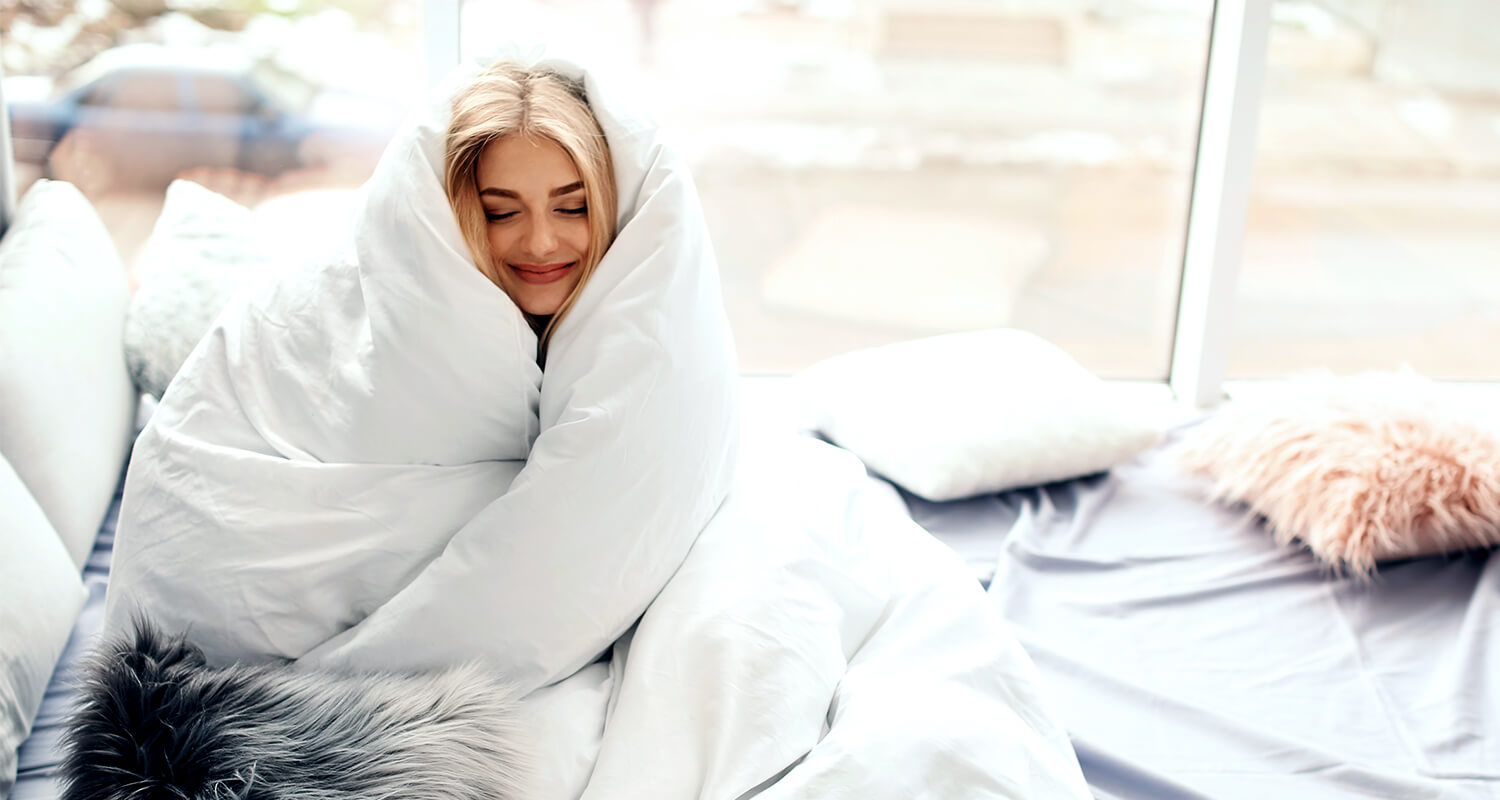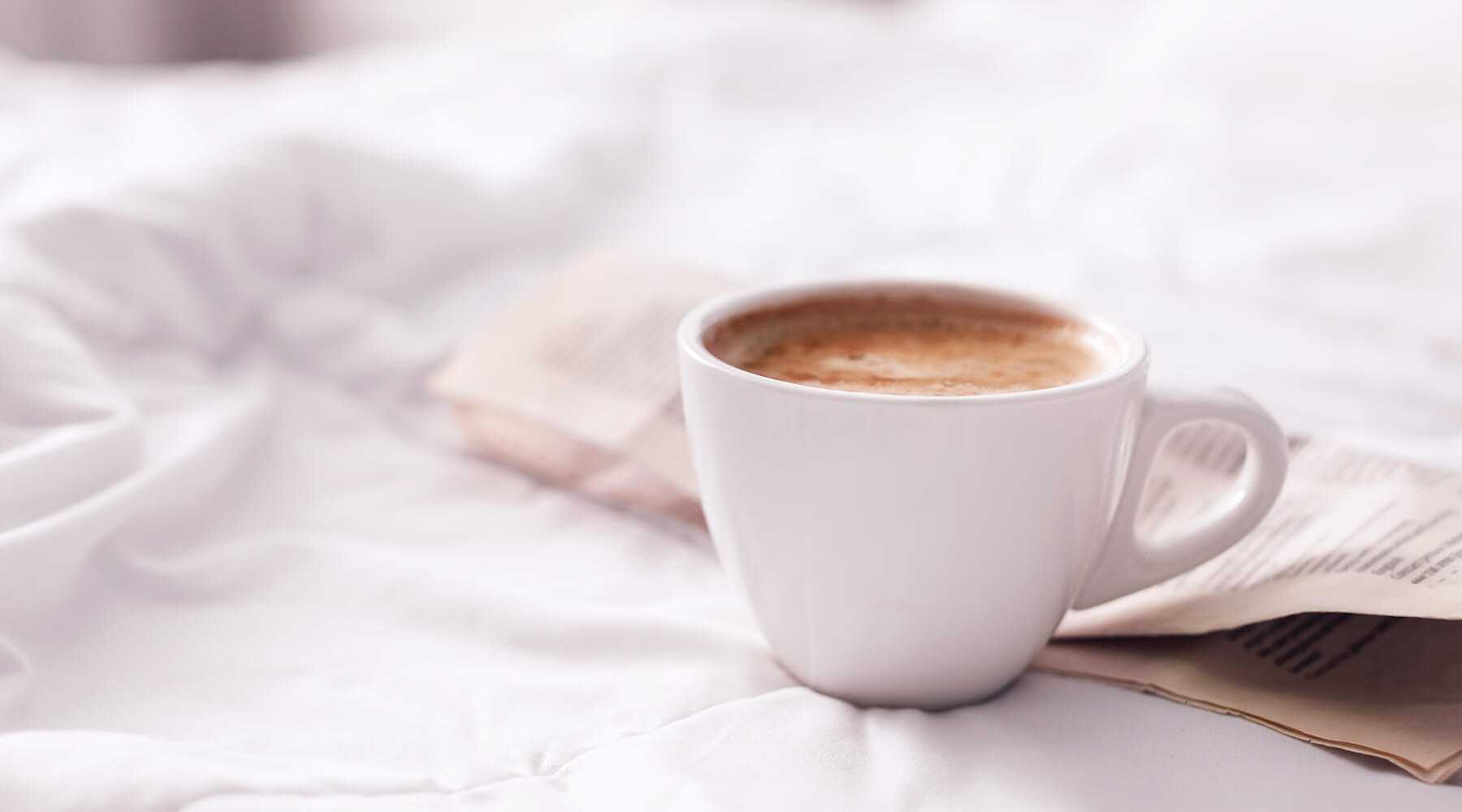
Sleep tips for the cold season
In fall and winter, many people suffer from daytime fatigue, lack of motivation, or sleep problems. Here, we explain how the increasingly cold days and lack of sunlight affect sleep and what you can do to still get a restful night's sleep and start the day full of energy.
Table of contents
- Sleep in winter
- Difficulty sleeping in winter
- 4 sleep tips for the cold seasons
- Relax specifically and get enough sleep
1. Sleep in winter
It is slowly getting cold and wet outside, nature is preparing for winter and, at the latest after the time change in autumn, it will get dark earlier in the evenings. This throws our Sleep rhythm Our bodies are confused, and our internal clock needs some time to adjust to the new circumstances after the warm summer months. However, even after adjusting to winter, we often still suffer from daytime fatigue, lack of motivation, or low energy levels. Especially in autumn and the snowy winter months, our bodies are particularly stressed because we lack vital daylight, we are more susceptible to colds and illnesses, and our skin, hair, and nails also suffer from the cold temperatures, drying out, becoming brittle, and weak.
It is all the more important to get enough and good sleep, because at night we fill up our energy stores, the immune system works at full speed and our skin, hair and nails are repaired and renewed.
2. Difficulty sleeping in winter
That our Need for sleep It's scientifically proven that sleep varies at different times of the year and that we generally need a little more sleep in winter. However, especially in winter, numerous factors occur that can prevent good sleep or impair sleep quality.
Our body clock is strongly oriented toward daylight and adapts our sleep-wake patterns to the natural course of the day. As the days get shorter and it gets colder outside, we spend more time indoors and receive less daylight, which our bodies already lack due to the fewer hours of sunshine during the winter months. This also affects the production of the important sleep hormone. Melatonin in the evening and prevents you from falling asleep quickly and getting a restful sleep.

But various external circumstances and changes in the sleeping environment can also make a good night's sleep a challenge in winter. Cold temperatures, dry heating air, unsuitable sleeping clothes or a changed Eating habits also impede restful sleep. Especially during the cold seasons, good sleep hygiene is important for daily performance, our health, and sufficient energy in everyday life.
3. 4 sleep tips for the cold seasons
#1 Temperature & Thermal Management

At night, when we rest and sleep, our body temperature also slowly drops. When we sweat or freeze, our body becomes active to Body temperature to regulate and prevent hypothermia or overheating. This negatively impacts the process of falling asleep and makes it difficult to sleep through the night.
Tip: Maintain a cool, but not too cold, room temperature (16-18 degrees Celsius is recommended) and favor breathable sleeping accessories (pillows, blankets, mattresses) and appropriate sleepwear. Avoid overly tight-fitting blankets and clothing (e.g.,tight socks), as these can disrupt blood circulation and promote sweating at night.
#2 Humidity and indoor climate
 In autumn and winter, the apartment and our Sleeping environment Temperatures are often higher than outside, which, combined with excessive heating or improper ventilation, creates a warm, dry indoor climate. However, excessively low humidity irritates the nose, respiratory tract, and mucous membranes, causing them to dry out easily, especially overnight, impairing breathing and disrupting sleep.
In autumn and winter, the apartment and our Sleeping environment Temperatures are often higher than outside, which, combined with excessive heating or improper ventilation, creates a warm, dry indoor climate. However, excessively low humidity irritates the nose, respiratory tract, and mucous membranes, causing them to dry out easily, especially overnight, impairing breathing and disrupting sleep.
Tip: Even in winter, try to ventilate sufficiently and correctly and maintain a moderate level of humidity (ideally between 40% and 60%) in order to create a pleasant indoor climate and also to supply the body with sufficient oxygen at night.
#3 Nutrition
 Our Nutrition has a major impact on the quality of our sleep. Especially in winter, we often consume heavy, high-fat or high-carbohydrate meals or turn to sugary comfort foods, which strain the digestive system, especially in the last few hours before bedtime, and make it difficult to fall asleep.
Our Nutrition has a major impact on the quality of our sleep. Especially in winter, we often consume heavy, high-fat or high-carbohydrate meals or turn to sugary comfort foods, which strain the digestive system, especially in the last few hours before bedtime, and make it difficult to fall asleep.
And also certain nutrients, such as caffeine, nicotine and alcohol disrupt sleep. Researchers at the University of Pittsburgh have shown that people consume more alcohol in cold weather and lack of sunlight. Alcohol dilates blood vessels, increasing blood flow in our bodies and thus creating a feeling of warmth.
Tip: Avoid heavy meals in the evening, limit alcohol consumption, and try to drink plenty of fluids during the day, even in winter. You can find out which foods can specifically promote your sleep in this article.
#4 Movement & Daylight

Exercise and sporting activity keep the circulation going, have a positive effect on the metabolism and promote healthy sleep. In the cold autumn and winter months, it is also important to consume sufficient daylight to regulate the sleep-wake rhythm and ensure restful sleep.
Tip: Integrate movement Regularly incorporate exercise into your daily routine and spend as much time as possible outdoors during the day. Even moderate exercise or relaxed walks keep us fit, increase sleep pressure in the evening, and improve sleep.
4. Relax and get enough sleep
When cold, darkness and stormy weather increasingly dominate our daily lives, sleep should not be neglected. Because in order to stay healthy and productive during the day, a strong immune system To protect ourselves from nasty pathogens and keep our moods healthy, it's incredibly important to relax sufficiently and sleep well at night. And those who wake up rested and refreshed in the morning can get the most out of their day and create the ideal conditions to fully enjoy the golden autumn and a romantic, snowy winter.
5.Conclusion
-
Cold, lack of daylight and dry heating air, unsuitable sleeping clothes, poor indoor climate or changed eating habits disturb sleep in winter
-
Ensure a comfortable sleeping environment with a moderate room climate (temperature: 16 – 18 degrees Celsius, medium humidity), choose suitable sleepwear and ensure an overall comfortable sleeping temperature
-
Avoid heavy meals before bedtime and stimulants such as caffeine and alcohol in large quantities to promote falling asleep and sleep
-
Stay active and exercise regularly, preferably in the fresh air, to consume as much daylight as possible and thus support sleep-regulating hormone production
Best wishes and see you soon!



Leave a comment
This site is protected by hCaptcha and the hCaptcha Privacy Policy and Terms of Service apply.